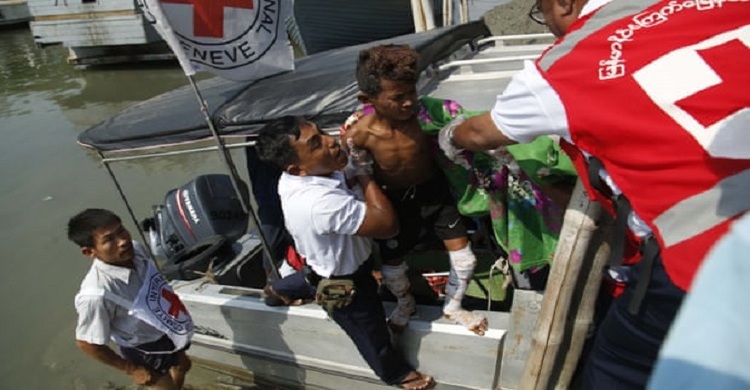Myanmar blocks hundreds of news sites and threatens editor with life in jail

Myanmar has cracked down on journalists, blocking news websites and maintaining a longstanding internet ban in some areas, prompting warnings it is becoming increasingly hard to monitor abuses in the country.
On Tuesday, Myanmar charged a journalist under a terrorism law for publishing an interview with the Arakan Army, a rebel group that demands greater autonomy for the state’s ethnic Rakhine people. The group had recently been labelled a terrorist organisation.
Nay Myo Lin, editor in chief of the Voice of Myanmar, could face life in prison. His website has also been blocked, along with other outlets that cover the ongoing fighting in Rakhine state, where about 730,000 Rohingya Muslims fled a military crackdown in 2017.
Phil Robertson, deputy Asia director for Human Rights Watch described the charges as absurd. “Quite clearly they are trying to get rid of any lines of reporting that they cannot control,” he said.
The country’s army has repeatedly filed cases against publications that cover the conflict, and only weeks ago dropped a recent criminal complaint it had filed against Reuters news agency.
On top of such legal action, Myanmar has also instructed mobile operators to block 221 websites, claiming they publish fake news and contribute towards instability in the country.
The crackdown on access to information adds to growing fears that communication blocks are making it hard to assess if Myanmar is complying a recent ruling by the international court of justice, which said that the country must implement “provisional measures” to protect the Rohingya community in Rakhine state from genocidal acts.
“Despite the UN secretary general’s call for a global ceasefire all around the world so that everybody can battle the Covid virus, you have the military in Myanmar doubling down on repressive actions to prevent any sort of independent information coming out of Rakhine state,” added Robertson. “It indicates the Burmese military is certainly not listening to anything the UN secretary general has said.”
Myanmar, which reported its first death related to the virus on Tuesday, has registered 14 cases of the coronavirus. Just weeks ago the country had maintained that it was virus free, with one official stating that people’s “lifestyle and diet” protected them from infection.
The internet-freedom group Access Now, which tracks internet shutdowns worldwide, said that the blackouts first imposed on some townships in Myanmar’s Rakhine and Chin state in June were now among the most prolonged on record.
While violence in the two states has limited people’s ability to move and access services, the internet blackout also “prevents people from getting informed, protecting themselves and their loved ones, and stopping the spread of the virus throughout their communities,” Access Now said in a statement earlier this month.
Source: The Guardian



